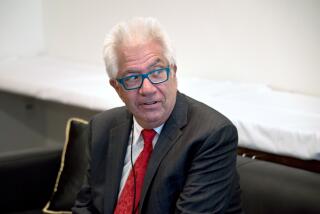Blueprint for Japan’s Economic Conquest?
- Share via
The article by Ambassador Mike Mansfield (Editorial Pages, May 11) is one of the most extraordinary that was ever written by an American ambassador. Were it not for the fact that we know that he is the ambassador of the United States, one could readily imagine him as Japan’s representative in Washington.
He writes of the important bilateral relationship in the world between the United States and Japan and feels that our lives are more closely linked than ever before, “a source of common prosperity and strength.” However, between the lines we can sense that here is not a common goal for both countries, but a blueprint for the economic conquest of the United States by Japan.
Mansfield has been our ambassador for about 10 years. In that time, we have seen our trade balance with Japan deteriorate from an approximate equality to one in which Japan has trade surpluses of almost $60 billion, while we go further and further into debt. Mansfield seems to take considerable pride that loans from Japan help to pay for some of our debts. “Capital flows, loans from Japan to the United States help cover our interest payments on the federal debt,” he writes.
In view of Japan’s enormous trade surpluses and our trade deficits, it is obvious that in the “bilateral relationship” it is only Japan that will have “prosperity and strength.” As for ourselves, despite Mansfield’s assurances, it does not look too promising. We have a national debt of more than $2 trillion, a budget deficit of well over $200 billion, and a trade deficit of more than $170 billion. Were it not for loans that we receive from money-rich Japan, we would have a hard time maintaining even our diminishing standard of living.
The tale grows worse. I believe the Japanese have decided that instead of constantly making loans to help us get by, they might as well buy the whole United States. They are already taking our place as the largest bankers and creditors in the world, and are currently involved in an aggressive program of acquiring American banks, real estate, construction firms, retail outlets, etc.
Mansfield naturally thinks this is a wonderful idea. “Roughly, 240,000 Americans work directly for Japanese companies,” he writes. If this relationship were mutually beneficial, as Mansfield thinks, we would expect to have Japanese working for Americans . . . However, that part is missing from the equation.
Mansfield seems delighted with what is happening. “The economies of both countries are already in the process of integration . . . and a free trade agreement would accelerate the process,” he says. Apparently the takeover is not going fast enough for him. “This would be a worthy and fitting goal for the United States as we enter the 21st Century,” he says. In view of our staggering and mounting debts, and Japan’s affluence, it’s far more likely to be the Century of Japan than that of the free trade impoverished United States.
JACK MARGOLIN
Marina del Rey
More to Read
Sign up for Essential California
The most important California stories and recommendations in your inbox every morning.
You may occasionally receive promotional content from the Los Angeles Times.













